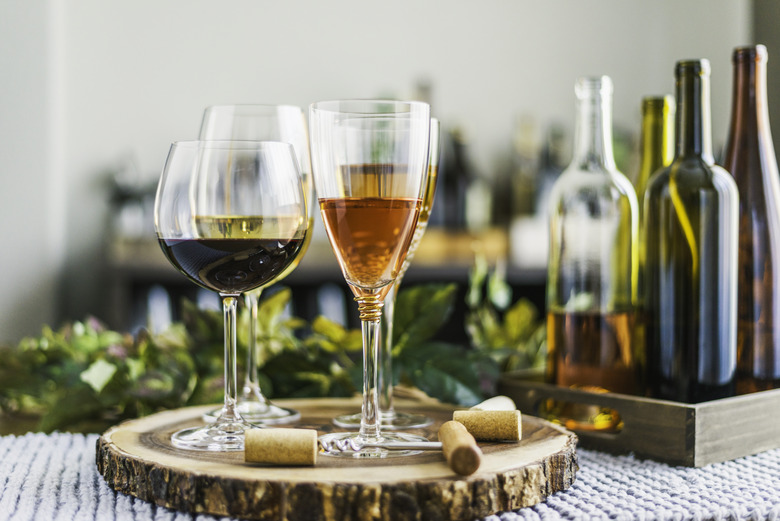A Beginner's Guide To Sustainable Wine Drinking
As the market for earth-friendly wines continues to grow, labels like "organic," "biodynamic," "vegan" and even "bee-friendly" vie for consumer's attention and their dime. But what does each one mean and are they really better than the conventional bottles of wine we've come to love? With the help of Gérard Bertrand, renowned French winemaker and trailblazer in sustainable wines, we break it down for you.
Why even bother with the following labels? Bertrand explains the importance of specifying the style of wine for the winemaker and the consumer and industry as a whole. "These labels act as a guarantee. Each specification ensures that these practices were upheld by the winemakers in the vineyard and in the cellar," Bertrand says. "By choosing to purchase and consume wines that are biodynamic or organic, consumers are encouraging positive change and showing their support for practices that are more respectful of the environment."
Organic wine
In the United States, in order for American-produced wines to earn a "certified organic" seal from the USDA the grapes must be grown without the use of pesticides or synthetic fertilizers — just like organic food. Also, all ingredients used in the making of the wine (including the yeast, which converts the sugar into alcohol) must be certified organic.
Sulfites, added in conventional wine-making to assist with the preservation of the wine, are not permitted in American organic wines unless they occur naturally. Europe, by contrast, is more lenient with the number of sulfites permitted, allowing 100 parts per million of sulfites.
Biodynamic wine
While it may sound like a new craze invented by environmentally conscious millennials, biodynamic farming dates back about 100 years. Austrian philosopher Rudolf Steiner — whose philosophies were a mixed bag — came up with the concept of a holistic form of farming that views the farm (or vineyard) as one ecosystem whereby each part of the process depends on the next to thrive.
In a biodynamic system animals live on the land and fertilize it, eliminating the need for chemical fertilization, and pesticides are forbidden. Steiner also promoted the idea that agricultural practices should revolve around the lunar calendar, allocating specific days for harvesting, pruning and watering the vine.
Bertrand felt an immediate connection to this philosophy after reading Steiner's book on agriculture and adapted it to his own vineyards 20 years ago. "This practice considers the treatments to be preventative and accompany the plant, in a specific way, to flourish in harmony with nature, to defend against hazards and to develop in balance," he says.
Natural wine
In essence, natural wine adheres to the principle of minimal intervention, that is, allowing the wine to develop "naturally." This translates to zero pesticides or herbicides and no or minimal additives.
Natural wine is not fined (the process of removing harmless molecules) or filtered like conventional wines, which often results in a cloudy appearance and sediment at the bottom of the bottle. The natural process of fermentation can also cause these wines to have a funky or sour taste. They're also less fruit-forward and yeasty in their aroma profile.
Orange wine, a white wine made using the red wine-making technique where the skins and seeds stay in contact with the juice during the fermentation, is one of the more popular natural wines in the mainstream market today.
Vegan
There's a common misconception that all organic wines are vegan. For a wine to be vegan, we return to the fining process, used conventionally to give wines that clear finish. Traditional fining agents used all derive from animals: casein (a milk protein), albumin (egg whites), gelatin (animal protein) and isinglass (fish bladder protein). So, for wines to be labeled vegan, these animal-based agents cannot be used.
It's important to note that all wines will self-fine if left alone long enough — these agents simply speed up the process. Alternate vegan-friendly fining methods are being discovered, such as activated charcoal and bentonite clay.
Bee-friendly
Bee-friendly wines, a relatively new category, consider the well-being of bee populations nearby. A bee-friendly certification doesn't just ensure that no pesticides harmful to bees were used in the production of the grapes; it also requires winegrowers to have a partnership with local beekeepers and to have beehives at the winery. While bees do not pollinate grapevines, it is estimated they pollinate one-third of the food we consume. Environmentally conscious winemakers like Bertrand make their welfare a top priority, as bees are a critical component in nature's cycle.
Which wine is right for you?
It's easy to feel overwhelmed by the variety of "good" wine choices popping up in the market. Bertrand stresses not to overlook your own needs. "The first thing to acknowledge is your own taste and preference. Sulfite-free wines [such as organic] have a specific profile and are known to be more connected to the flavor of the fruit, while biodynamic wines are more vibrant and show off the terroir of the region," he explains.
It may take research and tasting practice to become an advocate of the environment. But it's an assignment surely bound to bring in zero complaints. Cheers to you and our planet!
